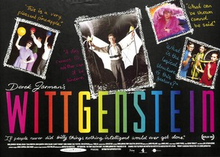fiction.wikisort.org - Movie
Wittgenstein is a 1993 experimental comedy-drama film directed by Derek Jarman and produced by Tariq Ali. An international co-production of the United Kingdom and Japan, the film is loosely based on the life story as well as the philosophical thinking of the philosopher Ludwig Wittgenstein. The adult Wittgenstein is played by Karl Johnson.
| Wittgenstein | |
|---|---|
 Theatrical release poster | |
| Directed by | Derek Jarman |
| Written by |
|
| Produced by |
|
| Starring |
|
| Cinematography | James Welland |
| Edited by | Budge Tremlett |
| Music by | Jan Latham-Koenig[1] |
Production companies |
|
| Distributed by |
|
Release dates |
|
Running time | 72 minutes[2] |
| Countries |
|
| Languages |
|
| Budget | £300,000 ($450,000)[1] |
| Box office | $40,029[3] |
The original screenplay by literary critic Terry Eagleton was heavily rewritten during pre-production and shooting by Jarman, radically altering the style and structure, although retaining much of Eagleton's dialogue. The story is not played out in a traditional setting, but rather against a black backdrop within which the actors and key props are placed, as if in a theatre setting.
The film was originally part of a series of 12 films on the life and ideas of the philosopher, produced by Ali on behalf of Channel Four. Only four of the scripts got commissioned: Socrates by Howard Brenton, Spinoza by Ali, Locke by David Edgar and Wittgenstein by Eagleton. Spinoza was filmed and directed by Chris Spencer as Spinoza : The Apostle of Reason. Citizen Locke was filmed and directed by Agnieszka Piotrowska. These were transmitted in 1994 as 52-minute television films.[4]
Plot
The film, in a series of sketches, depicts Wittgenstein's life from boyhood, through the first World War period to his Cambridge professorship and association with Bertrand Russell and John Maynard Keynes. The emphasis is on the exposition of his ideas and depicts his characteristics as a homosexual, an intuitive, moody, proud, and perfectionistic thinker, and a genius.
Principal cast
- Clancy Chassay as young Wittgenstein
- Karl Johnson as adult Wittgenstein
- Nabil Shaban as Martian
- Michael Gough as Bertrand Russell
- Tilda Swinton as Lady Ottoline Morrell[5]
- John Quentin as Maynard Keynes
- Kevin Collins as Johnny
- Lynn Seymour as Lydia Lopokova
Script
- Eagleton, Terry (1993). Wittgenstein: The Terry Eagleton Script, The Derek Jarman Film. London, England: British Film Institute, pp. 151. ISBN 978-0-85170-397-8
Award
- Teddy Award for best feature film, 1993[6]
Reception
Critical reception for the film has been generally positive and the movie holds a rating of 83% on Rotten Tomatoes, based on 6 reviews.[7] Derek Elley of Variety described it as an "immaculately lensed, intellectual joke" with a "gay subtext".[1]
It opened the London Lesbian and Gay Film Festival and grossed a house record £7,210 in its first 3 days at the ICA in London.[8]
See also
- List of avant-garde films of the 1990s
References
- Elley, Derek (23 February 1993). "Film Reviews: Wittgenstein". Variety. Retrieved 22 September 2018.
- "Wittgenstein". British Board of Film Classification. 3 March 1993.
- "1993 Film Grosses". Variety. 24 January 1994. p. 14.
- Rowland Wymer Derek Jarman, p. 158, at Google Books
- Tindle, Hannah (14 June 2017). "Tilda Swinton's Most Fabulous Character to Date". anothermag.com. Retrieved 21 September 2018.
- Derek Jarman Smiling in Slow Motion, p. 324, at Google Books
- "Wittgenstein". Rotten Tomatoes. Retrieved 21 September 2018.
- "Popular philosophy". Screen International. 2 April 1993. p. 17.
External links
- Wittgenstein at IMDb
- Wittgenstein at AllMovie
- Wittgenstein at Rotten Tomatoes
На других языках
- [en] Wittgenstein (film)
[ru] Витгенштейн (фильм)
«Витгенштейн» (англ. Wittgenstein) — псевдобиографическая драма 1993 года режиссёра-авангардиста Дерека Джармена о жизни и творчестве философа Людвига Витгенштейна (1889—1951).Другой контент может иметь иную лицензию. Перед использованием материалов сайта WikiSort.org внимательно изучите правила лицензирования конкретных элементов наполнения сайта.
WikiSort.org - проект по пересортировке и дополнению контента Википедии